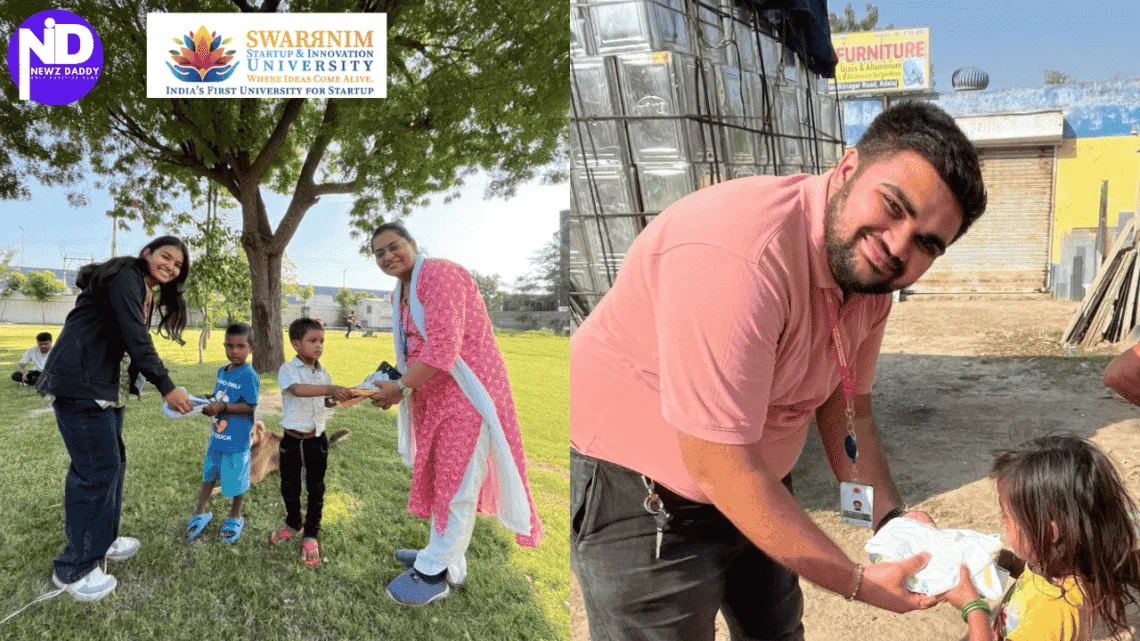Swarrnim Donation Drive Brings Empathy to Campus
Newz Daddy Educational Updates
On 14 November, Swarrnim Science College, part of Swarrnim Startup & Innovation University in Adalaj near Gandhinagar, held a well-planned donation drive in celebration of Children’s Day. About 50 students from BSc Semesters 1, 3, and 5 joined the faculty to collect items like clothes, books, toys, and stationery. Several donation boxes were arranged in the institute’s Idea Lab to make giving easy and visible.
Ms Nilam Patel, Assistant Professor in the Microbiology Department, coordinated the event. The drive was motivated by a desire to encourage kindness, empathy and social responsibility in young adults. The organisers wanted students to connect with underprivileged children not just through talk, but by taking real, practical action.
The campaign invited not just students but faculty and staff to donate items in good, usable condition: gently worn clothes, second-hand toys, stationery, and pre-loved books. Dr Archana Pandey, Principal of Swarrnim Science College, explained that the effort was meant to raise awareness among students about the difficulties faced by poorer families, especially regarding education and daily living. She said they hoped to instil a habit of sharing and to help students understand how their small contributions could make a big difference in local communities.
Swarrnim Science College is a part of Swarrnim Startup & Innovation University, which is based near Gandhinagar, Gujarat. The university is uniquely focused on entrepreneurship, innovation and startup skills, not just traditional academics. The institution is accredited under the Gujarat Private University Act, showing that it operates with official recognition. This background matters: students at Swarrnim are already encouraged to be socially responsible and entrepreneurial, so the donation drive aligns well with the university’s mission of creating globally competitive innovators.
Celebrating Children’s Day with a donation drive is symbolic. Children’s Day is often used to highlight the rights and needs of children. By choosing this day, the college emphasises giving rather than just festivity.
Research shows that early exposure to giving and community service builds empathy in young adults. When students donate usable items, they learn both generosity and resourcefulness — instead of discarding things, they extend their lives to help others.
Donations such as clothes and stationery are especially meaningful. Many underprivileged children lack basic school supplies, and second-hand items can significantly reduce their financial burden. Also, reusing items helps sustainability: clothes and toys are kept in circulation instead of being wasted. This aligns with broader values of environmental responsibility, which many educational institutions are promoting today. About 50 students took part, which is a good number for a campus event. Their involvement is a direct way to encourage active citizenship. When students lead or volunteer in donation drives, they gain leadership experience. They also feel a sense of ownership over social causes.
Ms Nilam Patel’s coordination is also important. Having a faculty member lead such efforts shows institutional support. That can inspire more students to join in future drives, or even start their own. Dr Archana Pandey’s comments highlight the educational value of such events. Beyond academics, this drive teaches life lessons: sharing, caring, and understanding how other people live. Many universities nowadays are embedding social responsibility into their curricula, because education is not just about exams; it’s about building citizens. Such drives are concrete actions, not just theoretical classes.
If items collected are distributed to underprivileged children, the drive could have a meaningful, long-term effect. Books might improve literacy, toys might support emotional development, and stationery could help children stay in school. Over time, repeated donation drives also build a network of giving. Local NGOs or community organisations could partner with colleges like Swarrnim to ensure that donations reach those who need them most. This could strengthen trust between educational institutions and local communities. While donation drives are noble, organising them well is crucial – one must ensure items are in good usable condition, and that there are trustworthy channels to distribute them.
Research into charities and fundraising shows that moral framing and trust play a big role in how people donate.
Also, simpler “nudges” — such as gently reminding students to donate — have been shown to increase generosity without coercion. Finally, consistent drives (not just one-offs) help build a culture of social giving.






